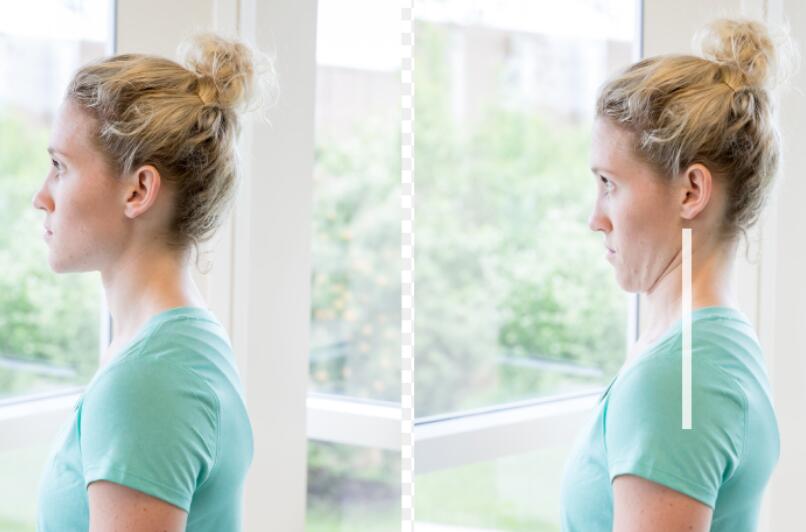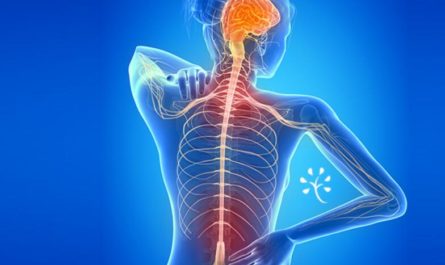A pinched nerve in the neck, also known as cervical radiculopathy, is a condition that occurs when pressure is applied to a nerve in the neck. This can result from several different factors, including a herniated disc, degenerative disc disease, spinal stenosis, or a bone spur. This condition usually occurs at the C5 nerve root leading to pain in the neck and shoulder. A study found that about 85 of 100,000 American adults suffer from pinched nerves in the neck yearly. This article will discuss the ten common causes of a pinched nerve in the neck with treatments.
What does a pinched nerve in the neck feel like?
The primary symptom of cervical radiculopathy is pain that radiates along the affected nerve. It is usually felt in the neck and can radiate outwards to the shoulders, arms, and even hands. In some cases, there may also be numbness, tingling, or weakness in the affected area.
Depending on the severity, it can feel like a dull ache or a sharp and sudden pain. The symptoms can worsen with certain activities, such as bending or twisting the neck. A pinched nerve in the neck can also cause neck stiffness and a variety of other symptoms.
In some cases, a pinched nerve in the neck can cause headaches, dizziness, and even difficulty breathing. It can also cause muscle weakness and a lack of coordination when performing certain movements.
In general, minor pinched nerves last a few days to a few weeks. More severe pinched nerves that involve a herniated disc or bone spur can take several weeks to several months to heal.
If a pinched nerve is not treated properly, it can cause permanent nerve damage. Therefore, it is important to seek medical attention as soon as possible if you are experiencing symptoms of a pinched nerve.

14 Common Causes of a Pinched Nerve in the Neck
Here are 14 common causes of a pinched nerve in the neck.
1. Disc herniation
The primary cause of pinched nerves in the neck is compression exerted on the tissues surrounding the nerve. Herniated disks, also called bulged, occur when the disc nucleus slips out of place into the spinal canal.
Disc herniation occurs when the cushioning disc between the vertebrae in the spine becomes damaged or worn down and the gel–filled center of the disc protrudes out, which can place pressure on the nerve root. This can cause a range of symptoms, such as pain, numbness, tingling, and weakness in the affected area.
Disc herniation is commonly caused by age–related wear and tear. Over time, the discs can become thin and brittle, allowing the gel–filled center to herniate. Other factors that can cause disc herniation include trauma, such as from a car accident or a fall, and obesity, which can put increased pressure on the spine and discs.
2. Aging
As we age, our bones and muscles tend to deteriorate. This gradual wear and tear on the spine and discs may cause the spinal discs to lose water and flatten. As a result, the pressure can compress nerves and cause pinched nerves.
3. Injury
Injury to the neck or spine is another primary cause of pinched nerves in Your Neck. The injury can result from over-exercise, sports, or an accident. Sleeping in an awkward position, Heavy lifting, pulling, or repetitive movements can also cause pinched nerves in Your Neck.
4. Sports activities
People who love to play sports that require excessive physical activities may often suffer from pinch nerves in the neck. As these players participate in the game for a long time, it is easy to get injured and cause nerve compression in the neck.
5. Degenerative disc disease
With age, one or more discs between the vertebrae will wear down. This will make the disks in the spine grow and degenerate. Your vertebrae will become narrow and pinch nerves. Degenerative disc disease commonly occurs in the lower back or neck.
6. Bone spurs
Cervical nerve root irritation is usually caused by a herniated disc, bone spur, ligament strain, or thickening of the ligaments in the neck. It can also be caused by poor posture, repetitive motions, or trauma.
Bone spurs, also known as bony growths, often form where bones meet each other like joints. Some bony may grow and put pressure on a nerve in your neck. This will cause pain, numbness, and tingling in your hand or arm.
7. Spinal Narrowing
Spinal stenosis refers to the spaces within your spine becoming narrow. Insufficient vertebral space can put pressure on your neck nerves and cause pain.
This condition usually occurs in the lower back and the neck. Some people may not have symptoms; others may experience tingling, numbness, and pain.
8. Rheumatoid arthritis
Rheumatoid arthritis is a chronic condition that causes joint inflammation that may pressure nearby nerves.
This is an autoimmune disease that affects the lining of your joints. It could start in one area and spread to other body parts. The deterioration of the joints can put pressure on the nerves, causing pinched nerves in the neck.
9. Pregnancy
Pregnant women are also prone to experiencing pinched nerves in the neck. The extra weight that accompanies pregnancy can also cause compressed nerves.
10. Obesity
The more fat one has accumulated in his neck, the more the chances of a pinched nerve in the neck. As your body size increases, the excess weight can affect your spine’s natural shape. The weight could put pressure on your nerves, causing pinched nerves.
In addition, there are other causes of pinched nerves, including diabetes, thyroid disease, prolonged bed rest, and repetitive tasks, such as typing on a keyboard.
11. Spinal nerve compression
When a nerve is compressed, it is unable to get enough oxygen and nutrients, leading to inflammation and pain. It can also cause a decrease in the nerve‘s ability to transmit signals to the brain. This can cause difficulty with movement and coordination as well as numbness and tingling.
12. Cervical spinal stenosis
Cervical Spinal Stenosis is a medical condition that can cause a pinched nerve in the neck. It is caused when the spinal canal narrows, and the spinal cord and surrounding nerves are compressed. This can lead to pain, numbness, and tingling in the neck, shoulders, arms, and hands. It can also lead to weakness in the arms, hands, and legs.
13. Cervical myelopathy
Cervical myelopathy is a condition caused by a pinched nerve in the neck. It is a progressive disorder that affects the spinal cord and can lead to serious neurological problems.
Symptoms of cervical myelopathy include pain in the neck, shoulders, arms, and hands; numbness and tingling in the arms and hands, difficulty walking, weakness in the arms and legs, and loss of coordination. In severe cases, the patient may experience loss of bladder and bowel control.
14. Nerve root impingement
Nerve root impingement is a medical condition that is caused by the compression of a nerve root in the neck. This impingement can occur from a variety of causes, including a herniated disc, bone spurs, or a narrowing of the spinal canal.
When the nerve root is compressed, it can cause a pinched nerve in the neck, which can result in a variety of symptoms. These symptoms may include pain, numbness, tingling, or weakness in the affected area of the body.

12 Best Treatments for a Pinched Nerve in the Neck
1. Yoga
Yoga is the easiest way to treat a pinched nerve. It can effectively relieve nerve and muscle tension. In addition, yoga can also help alleviate mental anxiety and improve sleep quality. This will allow the body to repair itself and reduce discomfort. However, if you feel pain when doing yoga, you should stop because it may cause more damage.
2. Stretch
Light stretches can help soothe the pain and relieve the pressure on your nerves. Make sure you don’t overwork your muscles. Keep the stretches moderate if you feel pain or discomfort when stretching. Small spaces have a significant effect on pinched nerves.
3. Splint
Splinting is another way to treat the affected area without getting the doctor’s treatment. Wearing the splint will give separate space for the nerve to heal. Although you may feel irritated while sleeping, it will treat the nerve and reduce the pinch’s intensity.
4. Heating or cooling packs
The heating and cooling packs are also great ways to reduce the intensity of pinched nerves in the neck. Applying these packs to the neck can help enhance blood circulation and lower swelling power.
5. Brace
The neck brace can help support the head’s weight and reduce the pressure on the neck. Rest can help reduce swelling and relieve pain caused by a pinched nerve.
6. Posture adjustment
Another way to get rid of the pinched nerve in the neck is by changing the posture. The wrong posture may apply pressure on the nerve in the neck and cause pain. Especially for those who have to sit in front of the computer for a long time because of work, choosing a correct posture can effectively improve nervousness.
7. Opt for a Standing Workstation
A sedentary lifestyle that includes sitting down for several hours a day can cause pinched nerves. It shouldn’t come as a surprise that standing workstations are gaining popularity.
Standing and having mobility during the day is essential to preventing and treating a pinched nerve. There are several standing work desks online, or you can request a desk from your human resources department.
If you don’t have access to a standing workstation, make sure you stand up and take a walk every hour to prevent pinched nerves.
8. Rest
Regardless of where you have a pinched nerve, getting a lot of rest is one of the most effective ways to relieve the pain.
You must avoid the activity causing pinched nerves, whether golfing, tennis, or swimming. Rest until the symptoms of the pinched nerves are entirely resolved.
After a few days, your pinched neck should feel relieved. If you don’t feel relieved or the pain returns, stop the activity and take plenty of rest.
9. Physical therapy
Physiotherapy is also a standard method of treating compressed nerves in the neck. This not only reduces pain but also enhances nerve function. But before you choose a physical therapy method, you’d better consult a doctor or physical therapist. They will select some exercise methods that suit you.
10. Anti-inflammatory drugs
The compression of nerves in the neck is usually caused by nerve inflammation. In this case, you can choose some non-steroidal medications with anti-inflammatory properties for treatment.
Some common medicines include ibuprofen and aspirin. After taking two to three doses, the irritation and inflammation will subside. Before you take any new medications, make sure you check in with your doctor.
11. Steroid injection
Sometimes steroid injections are also an excellent way to eliminate nerve compression in the neck. It can help reduce inflammation and eliminate swelling. As the swelling is reduced, the nerves gain the space to recover and ultimately relieve the pain.
12. Surgery
If all other methods fail, surgery is a last resort. Many surgeries include posterior cervical laminoforaminotomy, anterior cervical diskectomy, and artificial disk replacement (ADR). The doctor may consider many factors, including the nerve’s location, the problem’s intensity, and the availability of other options.

3 Best Exercises to Relieve Pinched Nerve in Neck
Many exercises are associated with a pinched nerve in the neck that can help eliminate the problem. Some of them include the following:
1. Chin tuck

The chin tuck is one of the most effective exercises that can give instant relief from the pinched nerve in the neck. It can reduce the neck’s pain and strengthen the muscles if done correctly over time.
In addition, it can help improve posture. All you need to do is put your finger on the chin and push it towards the neck for this particular exercise. By doing this, you have to make his chin appear double.
Next, you need to hold it for at least three seconds. In these three seconds, stress should be alleviated, and muscles should be relaxed.
Repeating this exercise 3 to 4 times will reduce neck pain. Note that consistency is the key. It would help if you repeated this exercise several times a day.
2. Head turn

A head turn is the second most effective exercise for a pinched nerve in the neck. It is undoubtedly much easier and more comfortable compared to the chin tuck.
With the help of this exercise, you can enhance the motion of the neck. However, if you feel uncomfortable performing this exercise, you must do it as slowly as possible. Even if the movements are small, doing them daily will help in the long run.
You must look ahead while straightening your neck and head for this exercise. Once done, you must turn the head in the right direction and keep it there for around 10 seconds.
Afterward, you must turn to the left side and stay in that position for around 10 seconds. Next, the head should be tilted from one side to the other and from up to down.
No matter how uncomfortable you feel, you should continue performing it regularly until you feel the pinched nerve gets relief.
3. Shoulder roll

As the neck is connected to the shoulder, any discomfort in the neck will cause a problem with the shoulder. Shoulder roll exercise is also a good way for a pinched nerve in the neck.
All you need to do is lift the shoulder blades and roll them back. Now, you need to roll them around a little. Repeating this around 4 to 5 times will relax the muscles a bit. Once completed, do the same action in the opposite direction again.
When to See Your Doctor?
Seek medical attention as soon as possible if you are experiencing the symptoms below.
- Severe neck pain that does not improve with home treatments, such as rest, heat, and ice.
- Numbness, tingling, or weakness in your arms or hands.
- Significant, ongoing pain limits your ability to move your head and neck.
- Difficulty sleeping due to neck pain.
- Your neck pain is accompanied by fever, headache, or other symptoms.
- Experience any signs of nerve damage, such as decreased reflexes, loss of coordination, or decreased sensation.
- Your symptoms don’t improve or worsen after a few weeks of home treatment.






